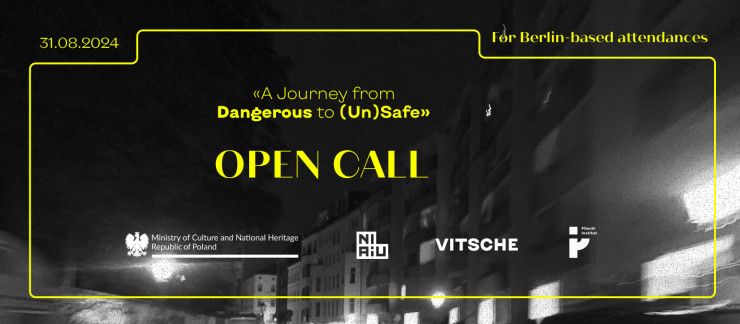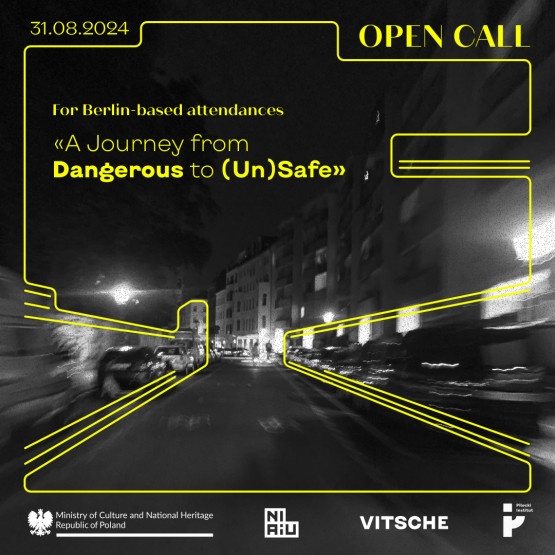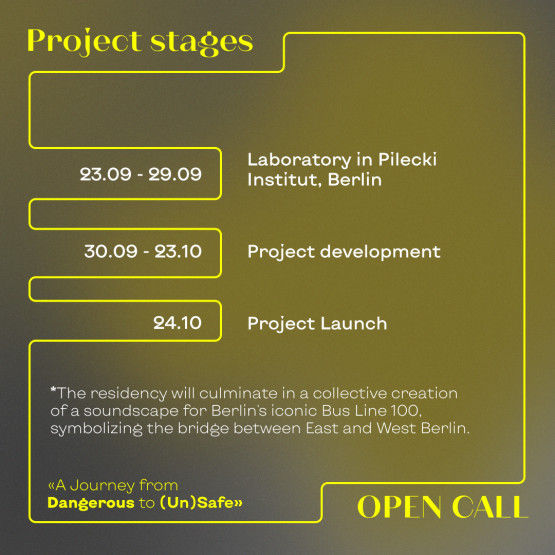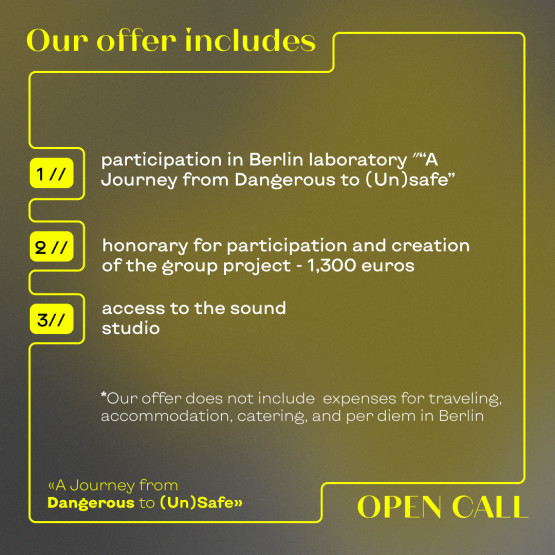Open Call: “A Journey from Dangerous to (Un)Safe” - Instytut Pileckiego
31.08.2024 () 09:00
Open Call: “A Journey from Dangerous to (Un)Safe”
interdisciplinary Laboratory
Deadline 31.08.2024
Timeline of the project:
23-29.09 Laboratory,
30.09-23.10 Project implementation,
24.10 Project Launch
Organizers: VITSCHE e.V.
National Institute of Architecture and Urban Planning (Narodowy Instytut Architektury i Urbanistyki), Warsaw, Poland
Partner: Pilecki-Institut
Location: Pilecki Institute, Berlin.
Who can apply: Berlin-based writers, screenwriters, poets, journalists, publicists, directors, researchers, and artists (individuals or duos) immersed in Polish, German, or Ukrainian contexts.
Language of the laboratory: English
The project’s concept, “A Journey from Dangerous to (Un)Safe,” comprises a Laboratory residency in Berlin with a week-long embodied practice, followed by three weeks of group artistic work on project delivery.
Laboratory Residency: Designed for three visionary artists based in Berlin from Ukraine, Poland, and Germany, this laboratory offers a dynamic fusion of workshops and lectures focused on exploring the multifaceted layers of urban life, the history of the city, and critical infrastructure that confront social anxiety, integration and attempt to find a place in a new city. Throughout the week, participants will engage in five workshops and lectures from prominent actors of the cultural scene with backgrounds in Germany, Ukraine, and Poland. Each delves into a unique aspect of the city’s rich tapestry and the human experiences of being forced foreigners.
Background: This project emerges from exploring material infrastructure and the social network transformed by the ongoing russian imperial war of aggression against Ukraine. Buildings, public spaces, borders, train stations, railroads, and buses are now imbued with the narratives of survival and livelihood of millions of refugees from Ukraine. The migration from Ukraine prompts a reevaluation of existing networks, giving rise to a new infrastructure that often emerges spontaneously. Since February 24, over 15 million refugees from Ukraine have crossed the Polish border, with more than a million now residing in Germany*. While some found accommodation with local families in shared flats, others temporarily stayed in refugee centres and social housing.
The co-living and co-existing of Ukrainians alongside individuals from other nationalities, navigating the space between war and protection, have given rise to new formal and informal support networks. These interactions have shaped the topographies of cities and enriched social connections and communities, sometimes in ways that are not immediately evident. With this project, Vitsche Berlin delves into these novel experiences that have unfolded in Berlin over the past years, reflecting on the profound stories of trauma, adaptation and resilience, exclusion and threats, interconnectedness, and disconnection that have emerged in the wake of the russian war against Ukraine. As culture journalist and critic Ksenia Bilash recently wrote, “In all this variety of borderline experiences, Ukrainians seem to be stuck between worlds: not European enough for ‘real Europe’ and not marginalized enough for the global ‘community of the disadvantaged.’” Artists will explore different borderline statuses, the colonial perspective of German society towards “others,” the notion of (un)safe places, and the experience of losing and gaining new land. They will reflect on traumatic and healing experiences, cultivating connections through new empathy and compassion, recovery, and resilience.
Location context: Berlin, a multicultural capital and a historical epicentre of transformation offers a unique backdrop for this exploration. As a city renowned for its rich and complex history and heritage, Berlin boasts a dynamic cultural scene and an interconnected, multicultural tapestry shaped partly by global conflicts and wars. What is the experience of being an in/outsider of diverse communities? The city’s history as a place of division and reunification, resilience and renewal mirrors the experiences of those navigating new lives amidst uncertainty. Being a citizen of Berlin means engaging in a continuous dialogue between the past and present, fears and dreams. Being Berliner_in implies synthesizing global influences, embracing and understanding diversity through the city’s complex political and cultural contexts, shaped by the body and memory experiences of its people who share its landscape. This project resonates deeply within Berlin’s community, where the interplay of local and international perspectives fosters innovative expressions of identity and belonging.
Laboratory program: During the week-long laboratory, selected participants will engage in a series of lectures and workshops led by prominent tutors from Ukraine, Poland, and Germany. Topics will include identity, migration, dis/integration, city orientation, urbanism, the city as scenography, communities, interconnections, memory, memory topography, and more.
Final result: Following the laboratory, the artists will create a soundscape that encapsulates their shared experiences and creative exploration on the theme of co-living and co-existence in Berlin. This collective expression aims to transcend conventional boundaries, resonating in public and media spaces to amplify their united artistic narrative.
Thus, artists will synthesize their insights and experiences to create a special soundscape for Berlin’s bus line number 100. This iconic route serves as a symbolic bridge between the East and West parts of the city, empowering the city’s complex history memory, echoing the connection between critical infrastructures of Eastern and Western Europe and human experiences of belonging or not belonging to the place. Through narrative exploration, the audio production will illuminate themes of human stories, refugee dis/integration, and the pursuit of belonging amidst uncertainty and displacement. Artists will explore and reinterpret Berlin’s prominent historical city locations through Bus Line 100 and discover the periphery, nooks, and cranes connected by bus stops.
Selection of the participants:
Participants will be selected through an open call procedure. The jury will include the project’s curators (Vitsche e.V. and NIAiU) and external experts.
Our offer includes:
- Participation in Berlin laboratory ″“A Journey from Dangerous to (Un)safe”
- honorary for participation and creation of the group project – 1,300 euros
- access to the sound studio (the production costs are covered by the project budget)
Our offer does not include
- expenses for traveling, accommodation, catering, and per diem in Berlin
A COMPLETE APPLICATION SHOULD INCLUDE
- CV in PDF format (two pages maximum) and portfolio (max 70 MB);
- Description of your artistic/academic/professional interests as related to the main topic that you can combine with a Motivation letter together (up to 2,500 characters incl. spaces);
Please send the complete application to the email support.networks@vitsche.org
Deadline 31.08.2024
The organizers reserve the right to contact the selected candidate(s) for additional online interviews.
ADDITIONAL INFORMATION
- Application documents will be accepted in English only;
- Courses, lectures, and workshops will be held in English;
- If you have any questions, please feel free to contact kateryna.tarabukina@vitsche.org
- The results of the recruitment procedure will be announced by 05.09.2024. The list of selected participants will be published:
– on the website of Vitsche and the National Institute of Architecture and Urban Planning
– on Vitsche social media: Instagram and X (ex Twitter)
– on NIAiU social media: Instagram and Facebook.
- The organizers are not obligated to substantiate the jury’s decisions. No appeal procedure has been provided for candidates selected to participate in the project; the present document will constitute an attachment to the agreement concluded between any such candidate and Vitsche e.V.
The interdisciplinary laboratory “A Journey from Dangerous to (Un)Safe” is a part of the international project “Networks of Support” organized by the National Institute of Architecture and Urban Planning (NIAiU) with partners from Ukraine (Lviv Center of Urban History), Poland (“Autoportret” quarterly), Czechia (VI PER Gallery) and Germany (Vitsche).
“Networks of Support” Autoportret quarterly international issue published in English in the framework of the project is possible to download for free in a PDF format following the link.
“Public spaces and infrastructural networks are created to fulfill everyday needs. Whether it is access to electricity, freedom of movement, or assembly, in the face of a hostile attack by another country, the ability to answer these needs becomes restricted, and the community affected by the crisis must look for new solutions. Possible uses of gathering spots, transit stops, border crossings, logistics centres, storage facilities, and vacant buildings expand in times of war. In emergencies and with an influx of people and goods, spaces that have a clear purpose in our everyday lives are given new purposes to an extent that is difficult to predict”, emphasise the NIAiU curators of the international “Networks of Support” project, Zuzanna Mielczarek and Kacper Kępiński.
Organizers:
Vitsche e. V.
Narodowy Instytut Architektury i Urbanistyki (NIAiU), Warsaw, Poland.
The project was co-financed by the Ministry of Culture and National Heritage within the framework of the “Inspiring culture” programme.
Partner: Pilecki-Institut
*Our exploration also reflects on findings from our partners at the Lviv Center for Urban History, specifically focusing on “Infrastructure of Culture and Imagination” and “Infrastructure of Livelihood” and focuses on the experiences and stories of Ukrainians and those forced to be foreigners.



